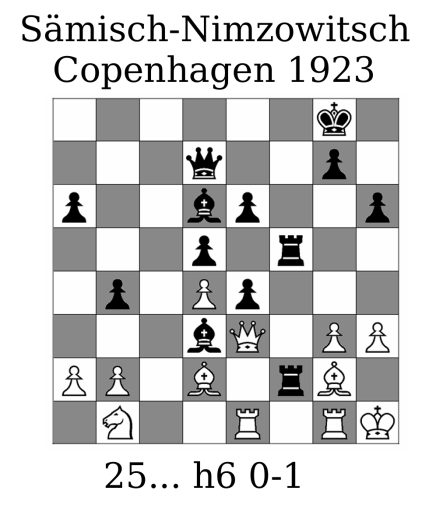I have just finished what is presumably the last Swedish exam of my life (unless I flunked it), so I’m going to celebrate by boring you with chess.
Some time ago I heard that an (Internet) chess acquaintance of mine had fallen badly ill and was possibly dying (he didn’t die and is all right now (update years later: he did die, of the same illness)). I tried to think of something nice to send him and came up with selecting four chess positions I considered beautiful for whatever reason, made a little poster of them and mailed it along with a brief letter. I don’t know how that was supposed to help, but the positions are still nice.

The culmination of a remarkable game. Kavalek has been sacrificing material throughout the game for one thing: the continued advance of his massive pawn roller. Gufeld has defended with vigor, but now it comes to this: Kavalek has sacrificed his last piece, is left with just king and pawns, and Gufeld has a rook left. Yet Kavalek is easily winning: 33. Rxf2 e3+ 34. Ke1 exf2 35. Kxf2 and black has a trivially won pawn endgame. Otherwise nothing can stop the pawns from rolling on and getting promoted. But perhaps the most shocking aspect of this position is that on move 32, black still has all eight pawns whereas his opponent has three. Talk about pawn-grabbing!

Probably the most famous position of the selection. This is the final position of the “immortal zugzwang game”. Zugzwang is a situation in which every move a player can make only makes his position worse; he would like to make no move at all, but that is not allowed. This is a slightly impure case because black would be winning even without the zugzwang, but it’s extremely rare for this situation to happen in the middlegame like this, so it became a celebrated example of Nimzowitsch’s maneuvering prowess.
The point of black’s last move, 25… h6, is that it quietly points out to white that he now has no move that won’t lose him material. There are a couple of pawns he can still push, but once black blocks those with his own pawns, white will have to move a piece and lose material (or get mated) and thus lose the game.

This is from the second Karpov-Kasparov World Championship match. The previous one was supposed to be played until one of the players won six games, but Kasparov, down 2-5, just refused to lose any more and in fact started to look unstoppable in the last couple of games. FIDE (the international chess federation) controversially aborted the match which had overlasted all previous ones (48 games, 41 of them drawn) and exhausted everyone, and declared a new one to be played the next year.
In that match it became obvious that Kasparov had grown considerably as a player, and won convincingly. This game was probably his finest effort. Kasparov was considered to be a mercurial, tactical player compared to the clear, cool and positional Karpov, but in this game he puts Karpov into an impossible bind quite early on. There are a number of positions I could have chosen from that game, but this one shows Kasparov’s dominance nicely: the black “octopus” knight on d6 rules the back rank and has the white rooks utterly stuck, the white queen has no safe moves, and in general white just has no play whatsoever. On move 22. And Karpov is playing white. This was inconceivable at the time, and legendary to this day.

This is the first realisation of the Babson task, a very famous chess problem theme. Any number of people dedicated themselves to finding a Babson problem, but none did, and the theme had even fallen out of fashion because it came to be considered impossible. Then in the eighties a Soviet soccer coach named Leonid Yarosh found one – and soon after that, he found another one. Some others have discovered alternate constructions inspired by this, but the Yarosh ones remain the most famous. If you don’t want to be (partially) spoiled regarding the solution, don’t read the next paragraph. Unless you already knew what the Babson task is and I already spoiled it for you.
The Babson task is this: construct a mate problem (white to mate in a fixed number of moves against any defence) such that if black defends by promoting to a queen, white can only make the required mate by promoting to a queen; if black promotes to a rook, white has to promote to a rook also – and the same with bishop and knight. If you have any experience of chess, you’ll know that this sounds impossibly difficult. I won’t spoil the whole solution of this problem, but it’s quite findable on the net.








